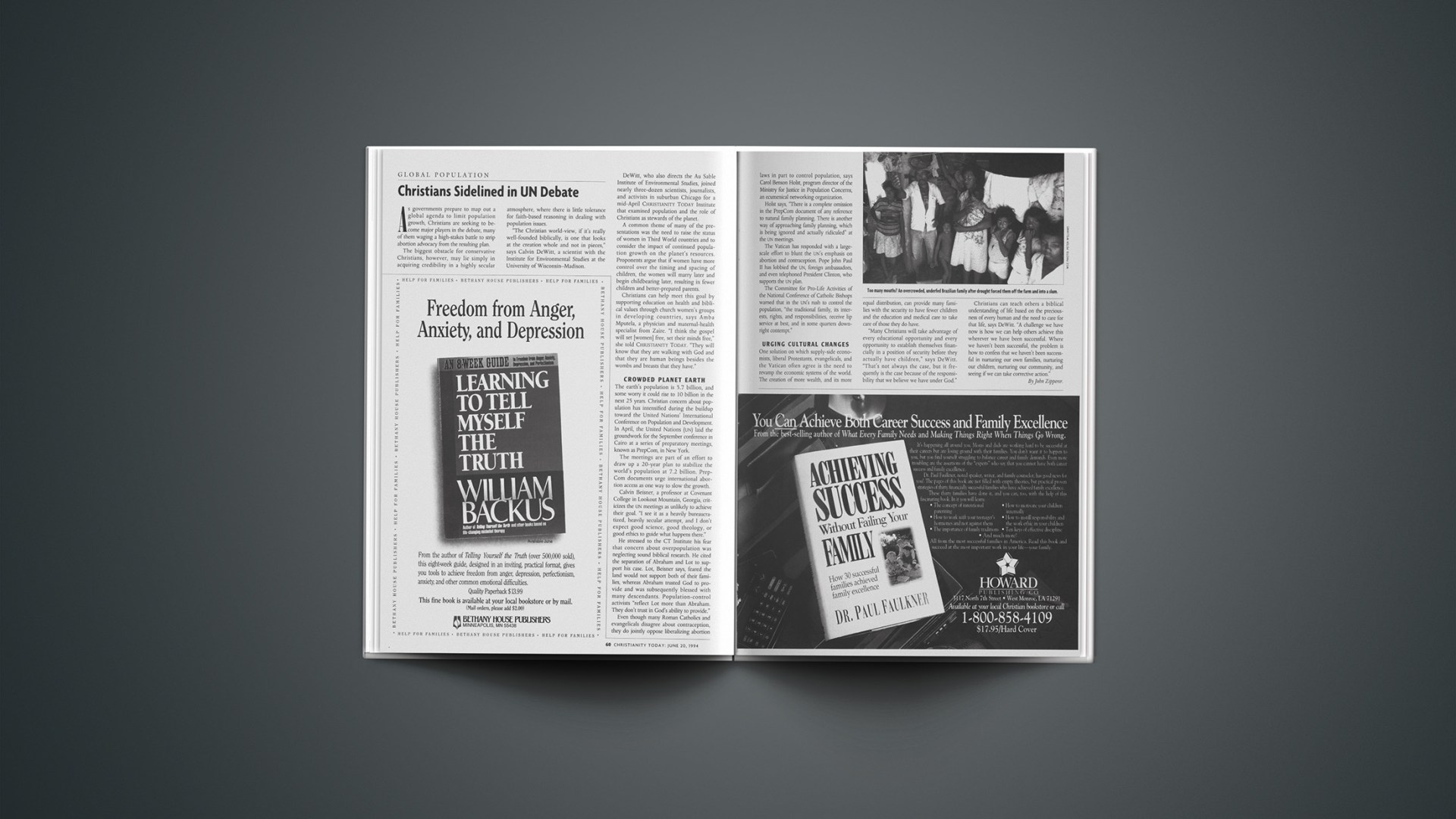As governments prepare to map out a global agenda to limit population growth, Christians are seeking to become major players in the debate, many of them waging a high-stakes battle to strip abortion advocacy from the resulting plan.
The biggest obstacle for conservative Christians, however, may lie simply in acquiring credibility in a highly secular atmosphere, where there is little tolerance for faith-based reasoning in dealing with population issues.
“The Christian world-view, if it’s really well-founded biblically, is one that looks at the creation whole and not in pieces,” says Calvin DeWitt, a scientist with the Institute for Environmental Studies at the University of Wisconsin-Madison.
DeWitt, who also directs the Au Sable Institute of Environmental Studies, joined nearly three-dozen scientists, journalists, and activists in suburban Chicago for a mid-April CHRISTIANITY TODAY Institute that examined population and the role of Christians as stewards of the planet.
A common theme of many of the presentations was the need to raise the status of women in Third World countries and to consider the impact of continued population growth on the planet’s resources. Proponents argue that if women have more control over the timing and spacing of children, the women will marry later and begin childbearing later, resulting in fewer children and better-prepared parents.
Christians can help meet this goal by supporting education on health and biblical values through church women’s groups in developing countries, says Amba Mputela, a physician and maternal-health specialist from Zaire. “I think the gospel will set [women] free, set their minds free,” she told CHRISTIANITY TODAY. “They will know that they are walking with God and that they are human beings besides the wombs and breasts that they have.”
CROWDED PLANET EARTH
The earth’s population is 5.7 billion, and some worry it could rise to 10 billion in the next 25 years. Christian concern about population has intensified during the buildup toward the United Nations’ International Conference on Population and Development. In April, the United Nations (UN) laid the groundwork for the September conference in Cairo at a series of preparatory meetings, known as PrepCom, in New York.
The meetings are part of an effort to draw up a 20-year plan to stabilize the world’s population at 7.2 billion. PrepCom documents urge international abortion access as one way to slow the growth.
Calvin Beisner, a professor at Covenant College in Lookout Mountain, Georgia, criticizes the UN meetings as unlikely to achieve their goal. “I see it as a heavily bureaucratized, heavily secular attempt, and I don’t expect good science, good theology, or good ethics to guide what happens there.”
He stressed to the CT Institute his fear that concern about overpopulation was neglecting sound biblical research. He cited the separation of Abraham and Lot to support his case. Lot, Beisner says, feared the land would not support both of their families, whereas Abraham trusted God to provide and was subsequently blessed with many descendants. Population-control activists “reflect Lot more than Abraham. They don’t trust in God’s ability to provide.”
Even though many Roman Catholics and evangelicals disagree about contraception, they do jointly oppose liberalizing abortion laws in part to control population, says Carol Benson Holst, program director of the Ministry for Justice in Population Concerns, an ecumenical networking organization.
Holst says, “There is a complete omission in the PrepCom document of any reference to natural family planning. There is another way of approaching family planning, which is being ignored and actually ridiculed” at the UN meetings.
The Vatican has responded with a large-scale effort to blunt the UN’s emphasis on abortion and contraception. Pope John Paul II has lobbied the UN, foreign ambassadors, and even telephoned President Clinton, who supports the UN plan.
The Committee for Pro-Life Activities of the National Conference of Catholic Bishops warned that in the UN’s rush to control the population, “the traditional family, its interests, rights, and responsibilities, receive lip service at best, and in some quarters downright contempt.”
URGING CULTURAL CHANGES
One solution on which supply-side economists, liberal Protestants, evangelicals, and the Vatican often agree is the need to revamp the economic systems of the world. The creation of more wealth, and its more equal distribution, can provide many families with the security to have fewer children and the education and medical care to take care of those they do have.
“Many Christians will take advantage of every educational opportunity and every opportunity to establish themselves financially in a position of security before they actually have children,” says DeWitt. “That’s not always the case, but it frequently is the case because of the responsibility that we believe we have under God.”
Christians can teach others a biblical understanding of life based on the preciousness of every human and the need to care for that life, says DeWitt. “A challenge we have now is how we can help others achieve this wherever we have been successful. Where we haven’t been successful, the problem is how to confess that we haven’t been successful in nurturing our own families, nurturing our children, nurturing our community, and seeing if we can take corrective action.”
By John Zipperer.










